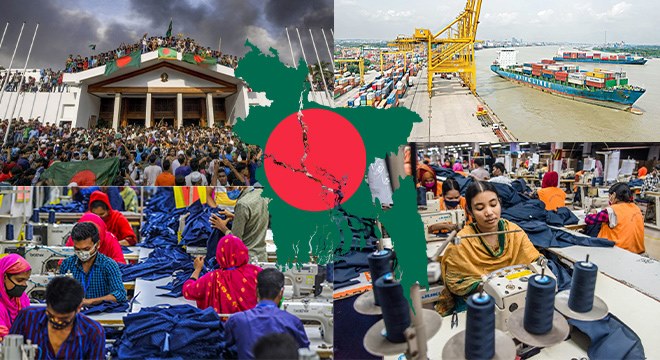
What Next For Bangladeshi Garment Industry After Fall Of Sheikh Hasina Govt
The student unrest that culminated in
the fall of Sheikh Hasina Government has created a big scar in the export
oriented Bangladeshi Ready Made Garment (RMG) industry. As the world’s second
largest apparel exporter with US$45 billion exports, almost all large global
apparel brands and fashion retailers' supply chains depend on the country. The
student protest against quota in Govt. jobs that started in the beginning of
July turned violent towards mid-month and witnessed painful loss of hundreds of
lives. Normal living was disrupted and garment factories were shut as
Government tried to curb the unrest with curfew and strong hand. While the
garment factories started re-opening and resumed work after a break of 5 – 6
days in July, the situation remained tense and re-erupted on 4th August leading
to lakhs of people marching to capital city Dhaka. The Bangladesh Army’s
intervention and Prime Minister Sheikh Hasina’s resignation and fleeing to
safety in the afternoon of 5th August ensured a win for the protesting nation
but news of violence continued till later part of the day. As the Army, protest
leaders and opposition parties are discussing the formation of interim Govt.
till hosting the next general election, there are uphill tasks in hand.
The garment industry which is among
the major export revenue earning sectors for the country (about 82% of share in
Bangladesh’s total export) is among the hardest hit. The unrest has led to loss
of reputation and trust from the foreign buyers as well as loss of critical
production of export orders. Political stability and peaceful environment are
must for any business which are severely dented by the recent developments in
Bangladesh. The fall of Sheikh Hasina Government has brought triumphant feel
among the protesting mass but formation of a caretaker Government and general
election are still far away. Till then export business would sail through uncertainty.
However, with the current status of
Bangladeshi economy, the country has no time to spare. The spirit and
enthusiasm of the mass must be guided towards productive nation building work
and strengthen the economy. Immediate priority could be curbing high inflation,
fall in forex reserve, corruption and restarting the factories. Good governance
would be a key issue but can’t expect less even from a care-taker government
which is on the cards.
Collaborative participation from
industry, of course, would be the key to overcome the challenges in hand.
Garment factories have lost several days’ production in July and now 3 days are
already lost. The total losses due to this would definitely amount to about a
billion dollars. Several dozens of factories also suffered the ire of the
protesting masses. Even the ports activities were disrupted. It is a trend that
July to September is the peak season for shipping goods to western markets for
Christmas and booking new orders for the spring/summer seasons. However, the
month long turmoil has affected the shipments and new order bookings. The end
result would be expensive air shipments, order cancellation or discount offer by
the exporters which eventually hurt the sector. Though Bangladeshi garment
makers are expecting strong recovery in exports as peace prevails, it would be
a task too heavy to handle. Bangladeshi garment industry can’t afford to crawl
back to normal production but will need to sprint as they resume operation.
And this will depend on how much
stability the interim Government can instill in the country and the economy.
Bangladesh cannot afford to slacken RMG exports which is the largest employment
generator for the country. Retailers are already establishing shorter supply
chains nearer to the market. Bangladesh losing its foothold in the
international arena would be a massive loss that would not be easy
to recover from. So, better act now before it's too late.
Though Bangladeshi garment makers are expecting strong recovery in exports as peace prevails, it would be a task too heavy to handle. Bangladeshi garment industry can’t afford to crawl back to normal production but will need to sprint as they resume operation".
If you wish to Subscribe to Textile Excellence Print Edition, kindly fill in the below form and we shall get back to you with details.












